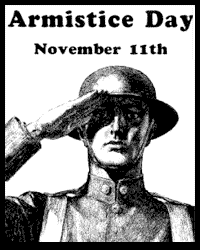 Learning History: A century since Compiègne the guns fell silent
Learning History: A century since Compiègne the guns fell silent
Nov. 9.– Shortly after 2am on November 11th 1918 a train came to a halt in a wood in Compiègne, near Paris. A second train pulled up on a nearby track. After four years of fighting, delegates of the German government sought an armistice from Ferdinand Foch, the commander of the French forces. Rare photos of the scene, hazy as a memory, show engine smoke twisting between the twiggy trees, makeshift boardwalks across the leaf-strewn ground and clusters of soldiers by the rails. At 5.15am the Germans signed the peace in the light of brass lamps in a teak-lined dining car. At 11am the guns fell silent along the 400km (250 mile) front, their thunder replaced by the pealing of church bells.
This peace ended a collective nightmare of hitherto unrivalled intensity and volume. The first world war was not just a grand tragedy. For the 67m who fought, it was a sordid hellscape. Few of the 10m killed in combat died from a “bullet, straight to the heart”, as pro forma telegrams to relatives put it.
.jpg/220px-Armisticetrain_(slight_crop).jpg) Many more bled to death in no-man’s land, their wails lingering for days like “moist fingers being dragged down an enormous windowpane”, as a British lieutenant wrote of the Battle of the Somme. Traumatised survivors sometimes slept in open sewers, and begged for their mothers as superiors ordered them over the top.
Many more bled to death in no-man’s land, their wails lingering for days like “moist fingers being dragged down an enormous windowpane”, as a British lieutenant wrote of the Battle of the Somme. Traumatised survivors sometimes slept in open sewers, and begged for their mothers as superiors ordered them over the top.
They guarded what slivers of humanity and dignity they could. At Compiègne today visitors can view silver rings from the trenches bearing initials (LV, MJ, SH or G) or four-leaf clovers; pipes with marks worn where teeth once clenched; a tube of insect-bite cream; letter-openers fashioned from shell casings, the names of yearned-for correspondents etched into their blades (“Marguerite”, “Mlle Rose-Marie”). A certain stoic humour also played its part. “I was hit. I looked round and saw that my leg had shot out and hit the fellow behind me (who got rather annoyed about [it])” wrote Charlemagne’s great-grandfather in his diary in 1915, just outside Ypres ...
Comments powered by CComment